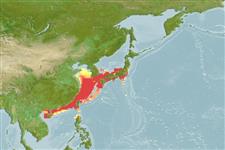Environment: milieu / climate zone / depth range / distribution range
ນິເວດວິທະຍາ
ສັດທະເລ ກ່ຽວກັນຫີນ; ລະດັບຄວາມເລິກ 20 - 200 m (Ref. 5222). Tropical; 38°N - 18°N, 108°E - 142°E (Ref. 5222)
Northwest Pacific: Korea, Japan (north to Hegura-jima Island), China (south to Hong Kong and Hainan Island), and Taiwan.
Length at first maturity / ຂະໜາດ / ນ້ຳໜັກ / Age
Maturity: Lm ?, range 54 - ? cm
Max length : 136 cm TL ຕົວຜູ້/ບໍ່ມີເພດ; (Ref. 89707); common length : 60.0 cm TL ຕົວຜູ້/ບໍ່ມີເພດ; (Ref. 9137); ນ້ຳໜັກສູງສຸດທີ່ເຄຍຈັດພີມມາ: 33.0 kg (Ref. 40637)
ຄີ (ໜາມ)ແຂງຢູ່ຫຼັງປາ (ທັງໝົດ) : 11; ຄີຫຼັງຂອງປາ (ຄີອ່ອນ) (ທັງໝົດ) : 13 - 15; ຄີ(ໜາມ) ແຂງຢູ່ຄີກົ້ນປາ
ກຸ່ມປາກະດູກແຂງ
ຄວາມຖີ່ຂອງກຸ່ມຖ່າຍທອດພັນ
ປາທີ່ມີການເຄື່ອນຍ້າຍຈາກທະເລໄປຫານ້ຳຈືດ ແລະນ້ຳຈືດຫາທະເລ
ປາທີ່ມີການເຄື່ອນຍ້າຍຈາກທະເລແລະໄປໄຂ່ຢູ່ນ້ຳຈືດ
ຄີກົ້ນຂອງປາ
ສັດທີ່ມີກະດູກສັນຫັຼງ
ການຖ່າຍທອດທາງກຳມະພັນຈາກພໍ່ແມ່ຫາລູກ: 3; ຄີກົ້ນຂອງປາ: 8. Distinguished by the following characteristics: adults dark greyish brown; body covered with small pale grey spots forming short horizontal lines and mottled pattern; lower margin of the anal fin and lower corner of the caudal fin with white edge; juveniles pale yellowish brown, body with 6 irregular oblique dark bars containing irregular pale spots; elongate body, depth 3.0-3.6 times in SL; head length 2.3-2.5 in SL; convex interorbital area; angular preopercle, serrae at angle distinctly enlarged; inconspicuous dorsal spine on opercle; convex upper edge of operculum; small and subequal posterior and anterior nostrils; maxilla reaching past vertical at rear edge of eye, tiny embedded scales on maxilla; absence of step on ventral edge of maxilla; 2 rows of well-developed canines on midlateral part of lower jaw; caudal fin rounded; mid-lateral body scales ctenoid, without auxiliary scales on body (Ref. 089707).
Inhabits rocky reefs; also found on muddy grounds (Ref. 089707). Juveniles occur in shallow waters. Commercially cultured in Japan.
Life cycle and mating behavior
ການຈະເລີນເຕັມໄວ | ການສືບພັນ | ການວາງໄຂ່ | ໄຂ່ | ຄວາມດົກຂອງໄຂ່ປາ | ຕົວອ່ອນ
Heemstra, P.C. and J.E. Randall, 1993. FAO Species Catalogue. Vol. 16. Groupers of the world (family Serranidae, subfamily Epinephelinae). An annotated and illustrated catalogue of the grouper, rockcod, hind, coral grouper and lyretail species known to date. Rome: FAO. FAO Fish. Synop. 125(16):382 p. (Ref. 5222)
IUCN Red List Status (Ref. 130435: Version 2024-1)
Threat to humans
Harmless
Human uses
ການປະມົງ: ເປັນສີນຄ້າ; ການລ້ຽງສັດນ້ຳ: ເປັນສີນຄ້າ; ຊະນິດປາທີ່ຖືກນຳໃຊ້ເຂົ້າໃນການຫາເພື່ອເປັນເກມກິລາ: ແມ່ນ
ເຄື່ອງມື
Special reports
Download XML
ແຫຼ່ງອີນເຕີເນັດ
Estimates based on models
Preferred temperature (Ref.
123201): 17.7 - 23.7, mean 20.5 °C (based on 94 cells).
Phylogenetic diversity index (Ref.
82804): PD
50 = 0.5000 [Uniqueness, from 0.5 = low to 2.0 = high].
Bayesian length-weight: a=0.01148 (0.00668 - 0.01973), b=3.06 (2.92 - 3.20), in cm total length, based on LWR estimates for this species & Genus-body shape (Ref.
93245).
ຊັ້ນເຂດຮ້ອນ (Ref.
69278): 4.0 ±0.66 se; based on food items.
ຄວາມຢືດຢຸ່ນ (Ref.
120179): ຕຳ່ຫຼາຍ, ປະຊາກອນຕຳ່ສຸດທີ່ໃຊ້ເວລາສອງເທົ່າຫຼາຍກວ່າ 14 ປີ (Preliminary K or Fecundity.).
Fishing Vulnerability (Ref.
59153): Very high vulnerability (82 of 100).
